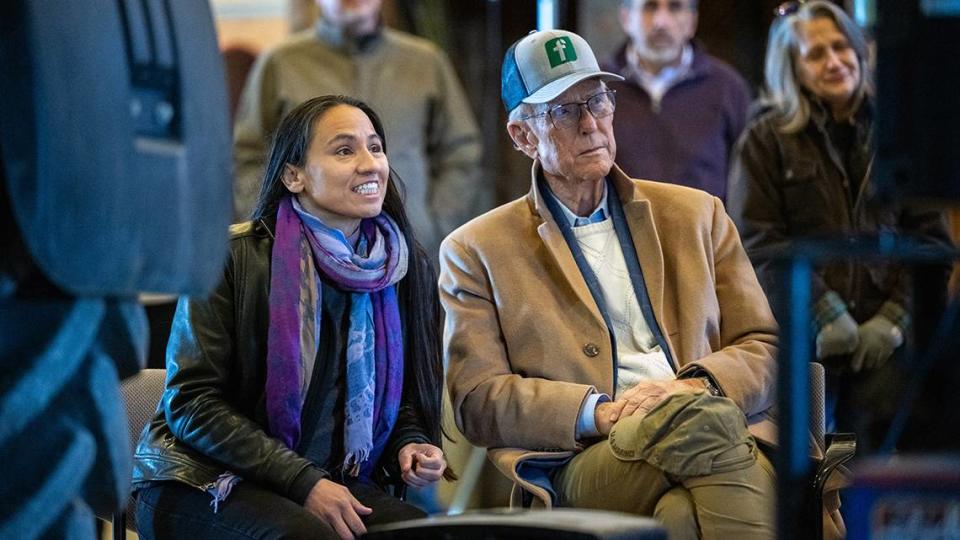Sharice Davids: Let’s harvest unity. Bipartisanship can support Kansas agriculture | Opinion
On a recent spring day, as planting season began for Kansas farmers, I gathered a group of bipartisan agriculture policy leaders, including former U.S. senator and chairman of the Senate Agriculture Committee Pat Roberts and current Kansas and U.S. Department of Agriculture officials, to join me in hearing from Kansas farmers about their successes, challenges and priorities. From our conversations, one thing was resoundingly clear: Congress must pass a bipartisan farm bill.
Since the Great Depression, the farm bill has been instrumental in equipping Kansas producers with essential tools, and Kansans have played an outsize role in shaping this law. Thanks in large part to the efforts of former Kansas Sen. Bob Dole, as of 1973, the farm bill has also included provisions guaranteeing access to nutritious foods for all Americans. And Sen. Roberts holds the unique distinction of being the sole member of Congress to have chaired both the House and Senate Agriculture Committees and played a pivotal role in negotiating eight farm bills — all bipartisan.
This year, Congress is working on reauthorizing the farm bill to sustain programs that uplift Kansas’ economy, support farmers, benefit children and lower grocery costs. However, as Sen. Roberts pointed out on our tour, partisan differences have hindered the progress of this vital legislation.
It is crucial for Democrats and Republicans to unite and pass a bipartisan farm bill that offers producers and small agribusinesses the support necessary for their success.
Despite the often-mentioned division in Washington, D.C., the process of crafting a farm bill has a rich history of bipartisanship. And this year, Kansas has two voices — me and Rep. Tracey Mann — on the House Agriculture Committee advocating for their priorities.
After completing my listening tour across every county in the 3rd District last year, I identified top priorities for the farm bill: lowering grocery costs, enhancing crop insurance, investing in Kansas’ agriculture research, ensuring the effectiveness of USDA programs and safeguarding nutrition programs to ensure access to nutritious food and promote healthy living.
For last month’s tour, we were also joined by U.S. Deputy Agriculture Secretary Xochitl Torres Small, former House Agriculture Committee chair Collin Peterson, former Kansas Rep. Jim Slattery, Kansas Lt. Gov. David Toland and Kansas Agriculture Secretary Mike Beam. Alongside these leaders, I once again heard directly from Kansans and gained more valuable insights into their experiences and challenges.
Our day began with a visit to Finley Farms, a multigenerational family-operated agribusiness in Edgerton specializing in corn and soybeans. We learned about the farm’s history and how USDA programs, such as the Environmental Quality Incentives Program, have helped combat soil erosion and improve water quality, ultimately allowing them to produce more healthy crops.
The Finleys highlighted challenges such as the absence of broadband internet, which is needed to operate farming equipment in our digital world. Ensuring universal internet access statewide has been a consistent priority of mine since coming to Congress. The farm bill offers a chance to further advance the strides made by the bipartisan infrastructure law’s $65 billion investment in broadband, particularly benefiting rural communities.
We also sat down for a conversation at Kansas State University’s Olathe campus with a group of producers, agribusiness owners, crop insurers and grocers to hear their perspectives built on decades of experience. We discussed addressing their farm bill priorities, fostering innovation in agriculture and improving the resiliency of our supply chains.
The farm bill is important not only for the farmers and ranchers directly affected by its policies, but also for everyone working hard to put food on the table for their families. Strengthening our agriculture supply chain — which encompasses businesses selling seed and fertilizer, processors packaging goods and truckers delivering food to grocery stores — plays a crucial role in reducing food costs for Kansans.
Agriculture is the largest economic sector in our state and has supported the livelihood of generations of Kansans. I will continue advocating for Congress to pass a bipartisan Farm Bill that bolsters our state’s economy and supports farmers, like the Finley family. We must support Kansas agriculture not just for this planting season but for the years ahead and the generations to come.
Sharice Davids represents Kansas’ 3rd District in the U.S. House of Representatives.



